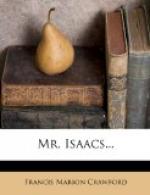I am sure most people feel as I do. It is far less painful to suffer wounds and sickness in one’s own body than to stand by and see the cold clean knife go through skin and flesh and cartilage; it is surely easier to suffer disease than to smooth daily and hourly the bed and pillows of some poor tormented wretch, calling on God and man to end his misery. There is a hidden instinct—of a low and cowardly kind, but human nevertheless—which bids us turn away from spectacles of agony whether harrowing or repulsive, until the good angel comes and whispers that we must trample on such coarse impulse and do our duty. “Show pity,” said the wise old Frenchman, “do anything to alleviate distress, but avoid actually feeling either compassion or sympathy. They can lead to no good.” That was only his way of making to himself an excuse for doing a good action, for Larochefoucauld was a man who really possessed every virtue that he disclaimed for himself and denied in others.
I felt much of this as I led Isaacs to the outer room, not knowing what form his sorrow might take, but feeling in my own person a grief as poignant, perhaps, for the moment, as his own. I had known he would come, that was all, though I had hoped he would not, and I knew that I must do my best to send him away a little less sorrowful than he had come. I was not prepared for the extreme calm of voice and manner that marked his first words, coming with measured rhythm and even cadence from his pale lips.
“It is all over, my friend,” he said.
“It has but begun,” said the solemn tones of Ram Lal, the Buddhist, from the door. He entered and approached us.
“Friend Isaacs,” he continued, “I am not here to mock at your grief or to weary your strained heartstrings with such petty condolence as well-nigh drove Ayoub of old to impatience. But I love you, my brother, and I have somewhat to say to you in your trouble, some advice to give you in your distress. You are suffering greatly, past the power of reason to alleviate, for you no longer know yourself, nor are aware what you really think. But I will show to you three pictures of yourself that shall rouse you to what you are, to what you were, and to what you shall be.
“I found you, not many years ago, a very young man, most exceptionally placed in regard to the world. You were even then rich, though not so rich as you now are. You were beautiful and full of vigour, but you have now upon you the glow of a higher beauty, the overflowing promise of a more glorious life. You were happy because you thought you were, but such happiness as you had proceeded from without rather than from within. You were a materially thinking man. Your thoughts were of the flesh, and your delights—harmless it is true—were in the things that were under your eyes—wealth, power, book knowledge, and perhaps woman, if you can call the creatures you believed in women.




